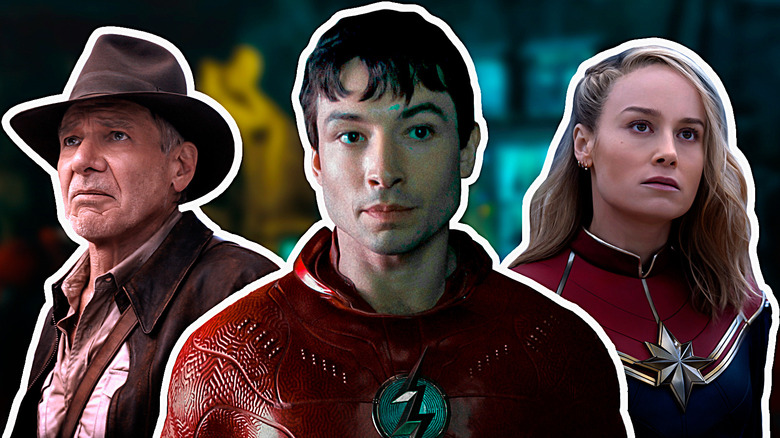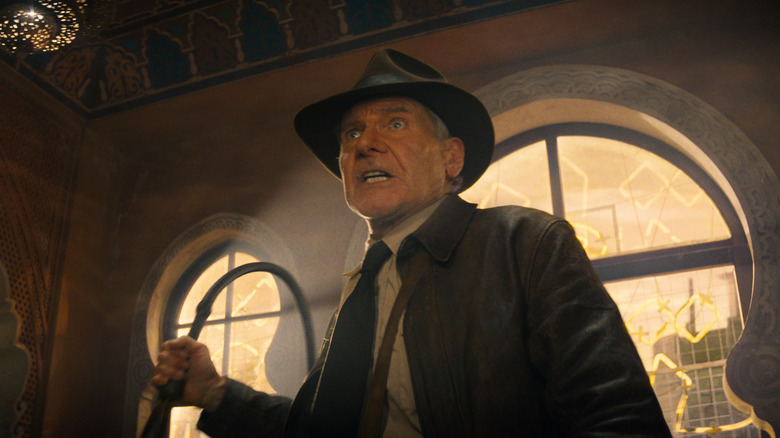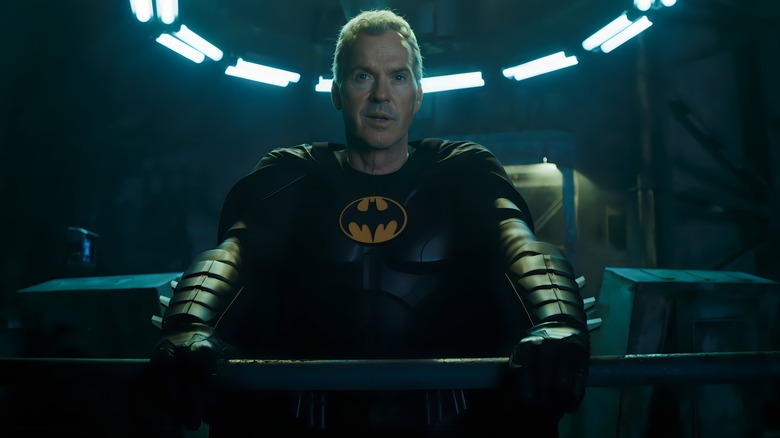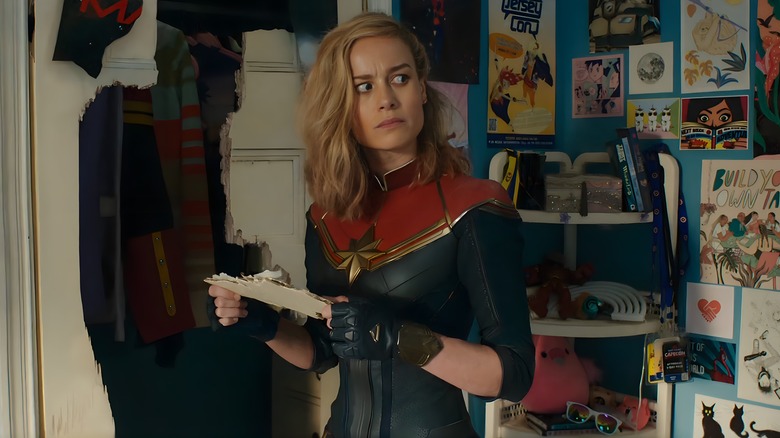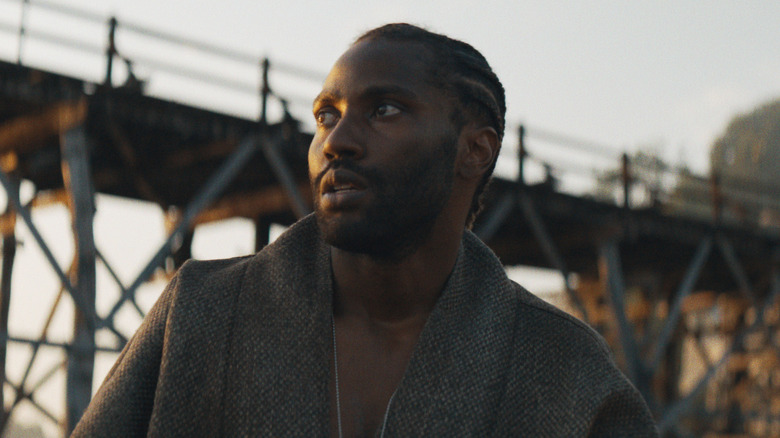2023 Box Office Flops That Will Change Hollywood Forever
Thanks to a series of seismic flops and misfires, 2023 will be remembered as a definitive year for the box office.
Although moviegoing continues to rebound following the COVID-19 pandemic, 2023's domestic haul to date is at $8.4 billion — a 13% increase from 2022's receipts, but still a long way from reaching 2019's $11.3 billion posting, a number that was achieved thanks to hits like "Avengers: Endgame," "Toy Story 4," and "Joker." While the pandemic may be in the rearview mirror, its effects can still be felt in the theatrical exhibition industry. Audience tastes have both substantially shifted and remained the same, a sentiment that can clearly be expressed in this year's biggest hits.
The most interesting box office conversation this year is the success of "Barbenheimer," which led to "Barbie" and "Oppenheimer" grossing over $2.3 billion worldwide combined. The success of "Barbenheimer," as well as hits like "Taylor Swift: The Eras Tour," "Spider-Man: Across the Spider-Verse" and "Five Nights at Freddy's," should no doubt be celebrated, but it's important to peel back the layers on what went wrong elsewhere.
2023 has been nothing short of a disaster at the box office for almost all of the major players. From Disney to Warner Bros., some of Hollywood's most prolific studios have suffered record losses, thanks in part to creative bankruptcy, shifting audience tastes, and poor release strategies. Hollywood, as we know it, will change for better or worse, thanks to these 2023 box office flops.
Indiana Jones and the Dial of Destiny
With a reported budget of $300 million, James Mangold's "Indiana Jones and the Dial of Destiny" debuted to an abysmal $60 million stateside in late June. By the end of its run, the fifth Indy flick brought home just over $380 million worldwide, with a domestic franchise low total of $174 million. While the "Indiana Jones" films are fondly remembered, they're a relic of the past and irrelevant to modern audiences, who treated "Dial of Destiny" with a significant amount of indifference. That turned Ford's final hurrah as the iconic adventurer into one of Disney's biggest bombs, with losses reported to be around $100 million.
The failure of "Dial of Destiny" should be a wake-up call for Hollywood's studios to not overestimate the value of nostalgia. Prior to the film's release, many questioned why Disney would greenlight a film featuring a geriatric Indiana Jones (Harrison Ford). Nostalgia can be powerful when delivered right — "Top Gun: Maverick" is a recent billion-dollar grossing example of this — but the tea leaves just didn't favor Indy, who already received his "one final adventure" with 2008's "Indiana Jones and the Kingdom of the Crystal Skull."
Disney's attempt to double dip felt creatively bankrupt and audiences responded, despite word of mouth being mostly decent. While the key takeaway from the failure of "Dial of Destiny" is that studios shouldn't bank on nostalgia if contemporary brand recognition isn't there, "Dial of Destiny" also signals that very few tentpoles truly deserve budgets north of $200 million, especially in a climate where nostalgia isn't as powerful as it once used to be.
The Flash
Released in the wake of several DC Extended Universe misfires, the confirmation of a planned reboot, and lead star Ezra Miller's controversial actions, "The Flash" was never going to be a box office juggernaut for the failing brand. After considerable hype drummed up by Warner Bros., "The Flash" barely grossed over $100 million domestically, wrapping up its worldwide run with a $266 million haul.
Like "Indiana Jones and the Dial of Destiny," Warner Bros.' "The Flash" made a bold error in assuming that moviegoers automatically care about legacy characters. Audiences rejected Michael Keaton's return as Batman, a creative decision that felt uninspired and calculated purely to capitalize on nostalgia. While superhero fatigue no doubt impacted "The Flash" — no superhero film has grossed over $1 billion since 2021's "Spider-Man: No Way Home" — one would have hoped that the return of a beloved character would spark interest in a brand (and genre) that's seen better days. The film's marketing heavily relied on Keaton's return, strategically diminishing the importance of Miller's character.
For Warner Bros., "The Flash" was confirmation that the DCEU was far from salvageable and that Batman, arguably the franchise's most popular character, isn't a compelling draw if the film surrounding him simply isn't good. One of the biggest superhero bombs of all time, the $200 million-budgeted "Flash" might be the last time we see a franchise lean so heavily into nostalgia as its only marketing point. It's obvious that audiences need more than that to return to cinemas — they need a good movie. For audiences, "The Flash" was simply not that. In fact, it wasn't even on their radar.
The Marvels
Superhero fatigue, especially on Marvel Studios' end, cannot be ignored. While their output has grown, thanks in part to their barrage of programming on Disney+, the studio's clout has started to dwindle. From controversial creative and narrative choices to poor visual effects, Hollywood's most self-assured studio is entering a new era of uncertainty. While the writing has been on the wall for some time, it's the release of "The Marvels" that will quite literally change the direction Hollywood goes in, as it searches after its next big cash cow.
Released after "Avengers: Infinity War" and during peak Marvel mania, "Captain Marvel" made $1.1 billion in early 2019, cementing the studio's reign. The long-gestating sequel, "The Marvels," which features characters from "Ms. Marvel" and "WandaVision," debuted to a harsh $46 million — a 70% drop from its predecessor's opening weekend. The lowest-grossing MCU film of all time, "The Marvels" definitively signals the end of Marvel's undisputed top spot.
Not the creative misfire that trolls would have you believe, "The Marvels" is fine — another offering from a studio that seems to have forgotten how to wow and innovate. But the numbers confirm that fatigue for the genre is real, as Marvel's receipts have continued to mostly dwindle since "Spider-Man: No Way Home." One studio, which dominated for over a decade with the creation of the "shared universe," is now beginning to see its palace walls crack. After changing the cinematic landscape, for better or for worse, Marvel's time could be over, and we don't know where Hollywood goes next.
Mission: Impossible - Dead Reckoning Part One
After posting a career-best profit with the release of "Top Gun: Maverick," Tom Cruise's "Mission: Impossible — Dead Reckoning Part One" had what it took to be one of the biggest films of the year. Instead, the seventh film in the franchise sort of just faded away after its mid-July release, grossing just $566 million worldwide. With a ballooned budget of $291 million thanks in part to COVID-19 restrictions, "Dead Reckoning Part One" reportedly lost Paramount Pictures around $100 million. That outcome felt shocking — "Fallout," the sixth film in the series, posted a franchise-best $786 million haul in 2018, and Cruise was revered throughout Hollywood for "saving cinemas" in 2022.
Following "Maverick," it felt like the movie star was back: Cruise was poised to rake in another billion with "Dead Reckoning," arguably the best film in the two-decade-old franchise. But the so-called "savior of cinema" was no match for the cultural movement that was "Barbenheimer" and, arguably, "Sound of Freedom," both of which had to be witnessed (depending on the circle you were in).
For audiences, it was more important to be a part of the larger cultural conversation that "Barbenheimer" and "Sound of Freedom" provided, cementing that social media traction really can make or break certain projects. With "Dead Reckoning" flopping, all hope for the movie star may be gone. Instead, Hollywood might now focus on what defeated it: a film made to appeal to a niche subset ("Sound of Freedom") and projects that are primed for virality on social media ("Barbenheimer"), even if that wasn't their initial intention.
The Creator
Moviegoers will proclaim endlessly on social media that they're exhausted by the constant franchise fare that populates multiplexes. Audiences say that they desperately want original films, but the box office failure of "The Creator" confirms that ticket buyers won't put their money where their mouth is.
A sci-fi epic that looks far more expensive than it is, Gareth Edwards' "The Creator" grossed $40 million domestically, with a worldwide final posting of $98 million. Stellar visuals, a notable B-list cast, action-focused marketing, and decent word of mouth (it got a B+ from CinemaScore) couldn't even push Edwards' labor of love to $100 million. While blame can partially be shifted to the 2023 SAG-AFTRA strike, which left its charming cast unable to promote the flick, "The Creator" did receive adequate marketing from Disney.
Made for a modest $80 million, one can't even blame the failure of "The Creator" on a bloated budget. While many might claim they yearn for originality, "The Creator" was widely rejected, debuting to $14 million on a weekend dominated by franchise offerings like "Saw X," "Paw Patrol: The Mighty Movie," and "The Nun II," all of which grossed over $100 million worldwide.
Every few years, the movie industry tries to give viewers mid-scale, original blockbusters, and they continue to fail. With the disappointment of "The Creator," cinephiles can say goodbye to new, daring, IP-less films entering theaters. But what can viewers expect from Hollywood in the next few years?
How did Looper decide on the biggest box office flops of 2023?
2023 will forever be remembered as an interesting year at the box office, particularly because of how many flops studios have had to deal with. While cinema is alive and well, the theatrical exhibition industry is heading into uncharted, potentially exciting territory after this year's big-budget bombs. Looper decided to move past the biggest financial losers (though they do dominate our lists) and instead focus on the failures that will shape what Hollywood greenlights going forward.
Research was done to speculate on what bombs would leave the largest impact on Hollywood's production and release strategy. From reeled-in budgets to exercises in creating the next big viral hit, Hollywood will spend the next few years trying to remedy the mistakes it made in 2023. Beyond that, all films except "The Creator" come from franchises that were, at one point, "sure bets." Audience tastes are shifting, and Looper ultimately decided on the five box office flops that it believes should leave Hollywood and its major players thinking about the future.
